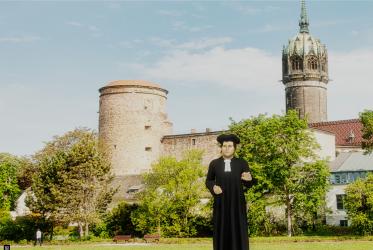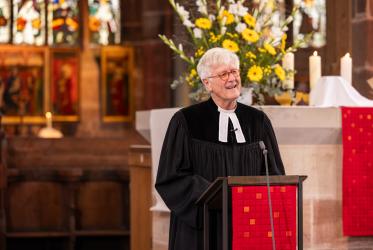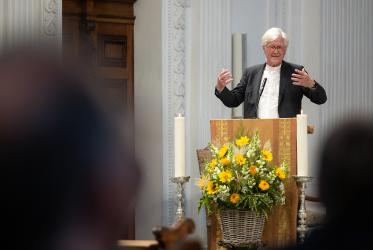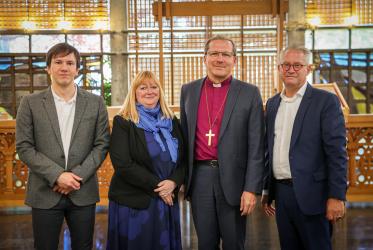Bishop Petra Bosse-Huber, from the Evangelical Church in Germany, is also a member of the World Council of Churches (WCC) Executive Committee. WCC Communication spoke to her about preparations for the WCC 11th Assembly, to be held in 2021 in Karlsruhe, Germany.
Could you describe the feeling when you learned that Germany would be the host for the next assembly for the WCC?
Bishop Bosse-Huber: My own feeling was excitement and also gratitude that it is possible to invite so many people to come to the southwest part of Germany. Also, the people in Germany are excited at the moment, as well as the people from neighboring countries in Europe, because it’s something special that the WCC assembly will be our guest in 2021. There are so many people from different religions and congressional backgrounds who will say: “That’s great!” We are very happy to do the work to prepare for the assembly, and to unite many people to come to Germany.
Could you describe the preparations so far? This is collaboration not only with Germany but also with neighboring countries.
Bishop Bosse-Huber: We are in close cooperation with the French partners as well as the partners from Switzerland, and this is a triangle in Germany where the borders are close together. At the same time, it’s historically a place where there was a lot of animosity. They have been enemies for centuries, especially Germany and France. It’s a symbolic place to come together and to speak about peace and reconciliation. It will be great because it’s also something from our common roots there, to come from being enemies to being friends.
Our preparations at the moment are very busy. We built an office in Karlsruhe with a wonderful team which is in close cooperation with the Geneva team to prepare everything locally. I’m looking forward to the assembly preparation because it’s really an exciting thing to do together.
What message would you share with assembly guests?
Bishop Bosse-Huber: I think there are many people who are not delegates or advisors but they want to come as guests, as ecumenically interested people. We want to invite them to come be part of this assembly, and also have the chance to meet people in this area, to go to special places, and to experience this Pilgrimage of Justice and Peace around Karlsruhe. We are thinking about all the opportunities we have there, with different confessional partners, and with the Roman Catholics. There are many ideas for what we can do together during the assembly.
The WCC will adopt a special youth communication strategy for the assembly. What would be your message to the young generation?
Bishop Bosse-Huber: We hope that there will be many, many young people. I hope also in the delegations that will really be a lot of young people because we need refreshment of the ecumenical movement and, at the same time, the delegates of younger age are so important for the rest of the assembly. So I hope they will be there, and that they will be a challenge also for us.
In your role on the WCC Executive Committee, and now as moderator of the Programme Subcommittee what are you most proud of in the time since the WCC 10th Assembly?
Bishop Bosse-Huber: Maybe that this wonderful overarching theme of the Pilgrimage of Justice and Peace worked in such a fruitful way. Because I have heard so may heart-touching stories around this theme. It was an invitation for many people to work together, not only the leadership, but on the ground. I’m so grateful for it. I wasn’t sure it would work when we started it in Busan during the last assembly. But now I would say it was great to have this.
Click here to learn more about the 11th Assembly of the World Council of Churches






